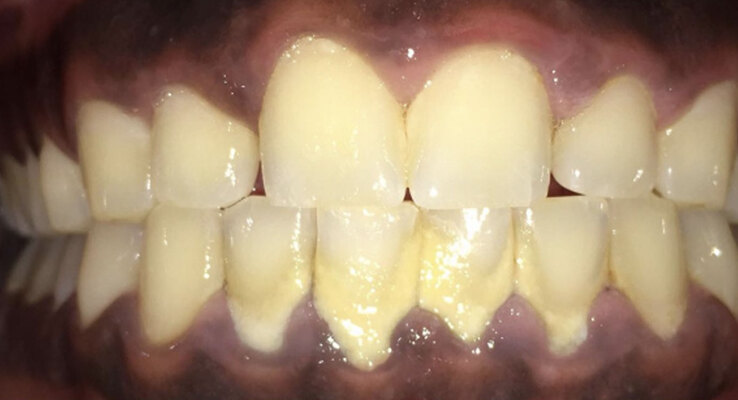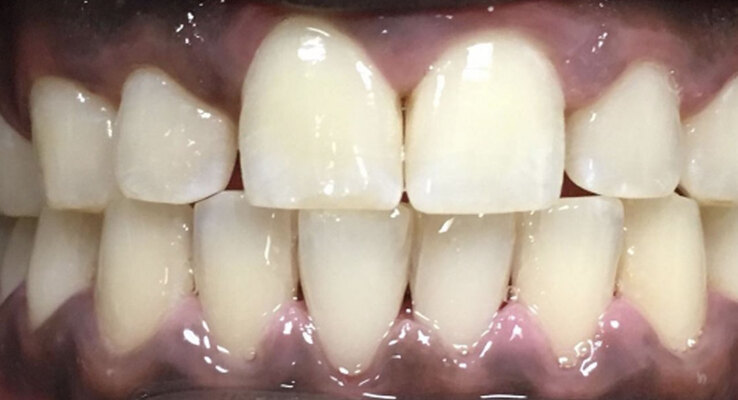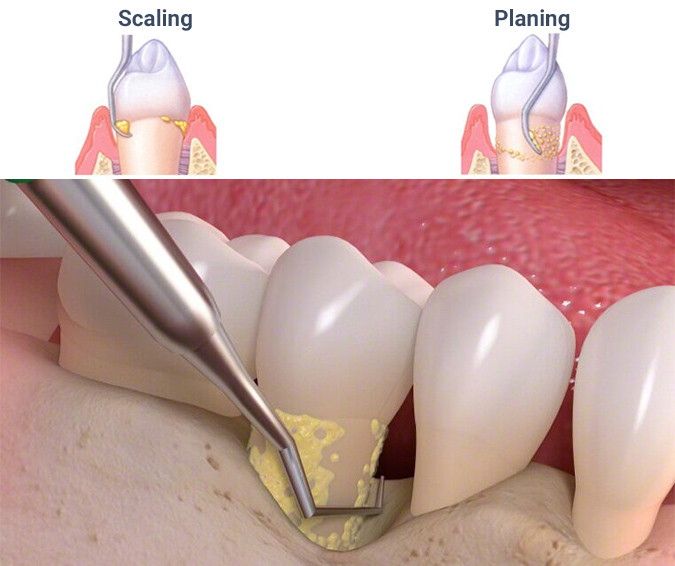When your teeth and gums are generally healthy, an ordinary teeth cleaning or scale and polish is all that’s needed to maintain optimal dental health. However, we will most likely recommend a deep cleaning, also called scaling and root planing, if you have periodontal disease. Dental scaling, also called deep cleaning for teeth, is a procedure that can save your natural teeth so you don’t need extensive restoration treatments. The dental deep cleaning process removes plaque and tartar that have settled deep under your gums and in the pockets between your teeth and gums.
Deep teeth cleaning treatment provides a more in-depth cleaning than an ordinary tooth cleaning and can prevent periodontal disease from worsening. Periodontal disease can become chronic, so you may require regular deep tooth cleaning treatments to control this condition.
Before


After
Who Should Consider Deep Tooth Cleaning
Regular dental cleanings or dental scaling provides a number of benefits. Most of the time, you don’t need a deep cleaning, but the longer you go without a family dental check-up, the more likely it becomes. Without a comprehensive deep cleaning, you may end up with more serious consequences.
You benefit from teeth scaling if you have certain characteristics or conditions, such as:
- Diabetes, because you may have more challenges fighting infections
- Males, who have a higher propensity to develop disease in their 30s or 40s
- Smokers, due to reduced circulation and a tougher time fighting off infections
- Females experiencing hormonal changes, such as during puberty, pregnancy or menopause
- A family predisposition to gum concerns
- A diagnosis of cancer or AIDS
- Taking a medication that causes dry mouth, as saliva helps bathe and clean teeth

The Problems Caused by Periodontal Disease
Chronic periodontal disease can significantly damage your gums, causing them to pull away from your teeth and creating large pockets between the teeth and gums. These pockets are called periodontal pockets and create the ideal conditions for harmful bacteria to thrive.
Periodontal pockets can become quite deep and impossible to clean with an ordinary toothbrush. Without treatment, periodontal disease can cause gum and bone loss. Teeth may start to loosen, changing your bite, and eventually, this disease can cause tooth loss.
Equally concerning, periodontal disease is linked to poorer overall health. It can worsen existing conditions or increase the risk of developing serious health problems.
Why Do People Develop Chronic Periodontal Disease?
There are several reasons why people develop this condition, and often it is due to poor oral hygiene. If you fail to brush and floss regularly, harmful bacteria can infect and inflame your gums.
Other factors that can cause periodontal disease include:
- Smoking
- Medical conditions such as diabetes
- A family history of periodontal disease
- Hormonal changes as women are more susceptible to developing periodontal disease during puberty, pregnancy, and menopause
- Poor nutrition
- Aging
What Are the Signs That I May Have Periodontal Disease?
Signs of periodontal disease include gums that bleed when you brush or floss or at other times. Your gums may look inflamed and red and feel tender to touch. You could have persistent bad breath or a foul taste. Your teeth may begin to shift position as they loosen, affecting your bite.
When you visit our Rockville Centre dental practice, Dr. Adam Shoukry or another member of our dental team can assess your gum health and diagnose any problems such as gum disease. We can then provide suitable treatment. Mild gum disease may only require an ordinary teeth cleaning, but advanced gum disease will benefit from a scaling and root planing treatment.
Success Stories
Incredible and Professional
By far the best dental experience I’ve had. I m so glad I found this office ! I used to be very anxious before getting a dental procedure or even getting my teeth cleaned, but Dr Shoukry was so incredible and professional. He completely changed my experience. I had a few cavities to heal and was never in pain - not during, not after the procedure. Everybody was incredibly nice to me. I trust this office 100% and would recommend it to anyone who’s looking for the best and fairest dental care. Will definitely send my friends and family.
What Does a Deep Cleaning Consist Of?
Deep teeth cleaning may be carried out during one or more appointments depending on the severity of your periodontal disease. Because your gums will feel more sensitive, we may suggest using a local anesthetic to reduce any discomfort during this procedure.
Scaling Your Teeth
The first part of the treatment is very similar to an ordinary teeth scaling, where we use ultrasonic tools to loosen hardened plaque, called calculus. The sonic vibrations help loosen tartar from teeth surfaces before we can carefully scale away the loosened debris using special hand tools to remove especially hard particles of calculus.
Root Planing
Periodontal disease causes gums to recede, exposing your tooth roots, and the next part of the procedure is to root plane or smooth these tooth roots.
Planing or smoothing these tooth roots helps remove all plaque and tartar buildup, and creating a smooth surface makes it easier for your gums to reattach to your teeth. At the same time, the smooth surface makes it harder for harmful plaque bacteria to adhere to these surfaces. Root planing also helps reduce gum inflammation, so your gums can fight the infection more effectively.
During a scaling and root planing treatment, we thoroughly clean out the periodontal pockets or spaces between your teeth and gums, which helps remove as many harmful bacteria as possible. When an infection is especially severe, we can place topical antibiotics into the periodontal pockets or may prescribe oral antibiotics to help eliminate the infection.
What to Expect after Teeth Scaling and Root Planing (SRP)?
Afterward, we can provide precise instructions on how to brush and floss your teeth, and it’s important to follow this advice closely.
Initially, your gums may bleed a little and feel a bit sore, but they will gradually become stronger and healthier if you persevere with regular brushing and flossing. We may prescribe a special antimicrobial mouthwash after treatment to help fight the bacterial infection.
Teeth scaling and root planing is the gold standard for treating periodontal disease and will provide good results. As your gums begin to heal after treatment, the periodontal pockets start to shrink, so your gums begin fitting more snugly around your teeth. Reducing the pocket size makes it easier to maintain good oral health afterward and reduces your risk of gum, bone, and tooth loss.
We will likely recommend a follow-up appointment to assess treatment efficacy and make sure the periodontal pockets are shrinking as expected. You will most likely receive a periodontal maintenance plan where you need to return for regular deep dental cleanings, usually every three or four months instead of every six months.
Aftercare for Dental Scaling
Dental scaling, combined with following your dentist’s instructions regarding daily oral hygiene, reverses periodontal disease in most cases. You may have to use a specialized toothpaste or mouthwash for a period of time to protect your gums and encourage recovery.
The deep dental cleaning procedure may lead to some mild discomfort afterward. Even working carefully, your dentist must move already tender gums to thoroughly remove plaque and tartar. Taking pain relievers, either over-the-counter or prescribed, and chewing soft foods help until the discomfort disappears in a day or two. Avoid spicy or acidic foods such as citrus, red wine, juice, pickles and tomatoes for a few days to avoid irritation.
Stay away from hard, crunchy and over-sized foods for a few days as well. Rinsing often with a warm, saltwater solution encourages healing. If you experience swelling, an ice pack helps and may reduce discomfort. Your gums usually heal well within just a few days.
How to Prevent Periodontal Disease
Periodontal disease is often called a silent disease because the early symptoms can develop unnoticed.
It is a major reason why we strongly recommend regular dental checkups and deep teeth cleanings combined with a good oral care routine at home. An effective preventive dental care routine will help prevent gum disease from developing, ensuring your gums remain strong and healthy.
The routine is very easy to follow and includes:
- Brushing with a soft-bristled toothbrush at least twice a day using fluoride toothpaste
- Flossing every day
- Replacing your toothbrush every three months or sooner if the bristles look worn
- Eating a balanced diet, so your gums receive all the necessary nutrition to fight disease
- If you smoke or use tobacco products, please quit, and your healthcare provider can offer practical advice and help
Try to keep a close eye on your oral health between your regular dental exams. If you notice any new symptoms, especially bleeding gums, please contact us for help and advice. When we can treat the first signs of periodontal disease, we can usually reverse this condition entirely before it can permanently damage your dental or general health.

Dr. Adam Shoukry, DDS, is a cosmetic dentist who strives to provide each of his patients with personalized care and educate them on the state of their dental health so that they can make informed decisions. Dr. Shoukry really enjoys his work and is committed to continued education, having attended several accredited courses in every aspect of dentistry.
Dr. Shoukry graduated from NYU College of Dentistry with a Doctor of Dental Surgery degree and then completed his general practice residency at Nassau University Medical Center. Being a member of the American Dental Association, the Academy of General Dentistry, and the American Academy of Cosmetic Dentistry, Dr. Shoukry strives to provide comprehensive dental examinations, a full range of cosmetic treatments, and the best restorative oral health care available.
